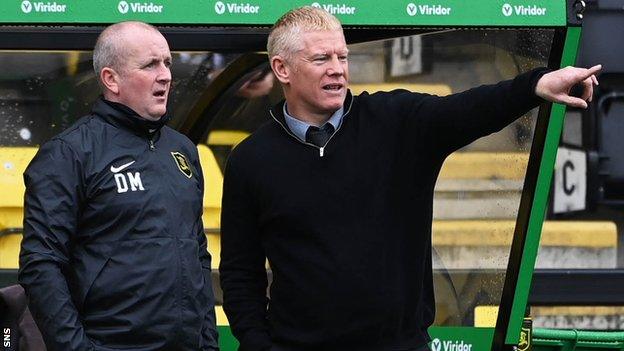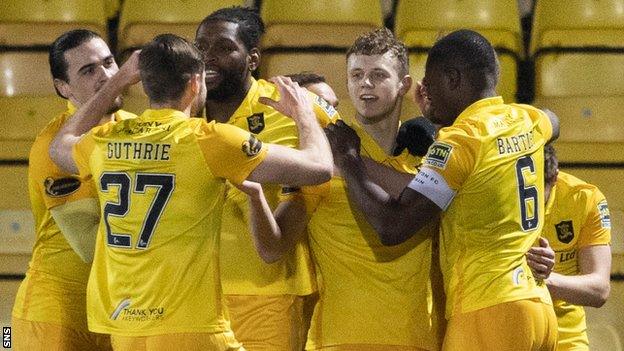Livingston: David Martindale's Scottish FA hearing explained
- Published
'I've earned the right to be passed fit and proper'
David Martindale is Scottish football's success story of the moment.
The man who began the season in the background at Livingston has now won nine and drawn two games since taking over as manager from Gary Holt, deservedly taken points off Celtic twice and on Sunday guided them further along an incredible journey to next month's Scottish League Cup final.
Yet, the future of the Premiership's in-form manager will be up for debate on Tuesday as he faces a Scottish FA fit and proper hearing after succeeding Holt late last year.
Martindale has previously been unsuccessful in the process and has spoken openly about his conviction and time spent in prison more than a decade ago.
Here, BBC Scotland outlines the background to Tuesday's SFA hearing and asks what it could mean for the 46-year-old.
Why is it happening?
'I was the wrong crowd' - Livingston's David Martindale on putting prison behind him
Martindale spent three-and-a-half years years in prison after pleading guilty to being involved in organised crime relating to offences in 2004. He was released in early 2010, three years short of his full sentence.
While awaiting trial, he enrolled in university and completed his degree after his release from prison before moving into employment in the construction industry.
In 2014, the former junior footballer began volunteering in a coaching capacity at Livingston. Later, he got his B certificate coaching licence, though not with the SFA. Martindale told BBC Scotland last month he was one hour of coaching away from obtaining his A licence.
He continued to work as part of Livingston's coaching staff and became head of football operations when Holt was appointed boss in 2018.
How did we get here?
Livingston enjoyed ninth and fifth-place finishes under Holt but their form dipped at the start of the 2020-21 campaign, culminating in the manager resigning on the back of a 1-0 home defeat by St Mirren.
Martindale was initially put in interim charge - having had a previous spell in temporary charge before Holt's appointment - and the club announced on 21 December that he would be manager until the end of the season.

David Martindale and Gary Holt worked together for 27 months
Martindale, in pursuit of becoming a club official, was deemed not fit and proper after going through the SFA process last season.
"I answered everything as honestly as I could," Martindale told BBC Sport's Football Focus prior to Sunday's match. "I think they're well within their rights to question my integrity. Hopefully, by going through that process and me ticking the boxes that I've had to tick, I'll come out of it with a positive answer."
What is a fit and proper hearing?
Assessing fit and proper persons is not exclusive to football but such procedures have been used in the sport for more than 15 years.
Each year, clubs provide the SFA with an 'official return' that lists directors and other club officials. Member clubs also have to notify of any changes to the most recent official return.
According to the SFA's handbook, external, the organisation's board "reserves its discretion as to whether or not such a person is fit and proper".
Ultimately, it will be two people from Scottish football's professional game board who determine Martindale's suitably.
Public support
Football Focus: David Martindale's path from prison to Livingston manager
After viewing his interview on Football Focus, Professor Phil Scraton was motivated to write to the SFA, external in support of Martindale. Scraton is professor emeritus of law at Queen's University Belfast and sat on the Hillsborough Independent Panel.
"Throughout my work I am aware of the institutional difficulties faced by prisoners leaving prisons unscathed by the difficulties they face inside and the uncertain futures they experience in the community," Scraton wrote.
"By accepting he passes the 'fit and proper person' test, the SFA not only, rightfully, would recognise his transition but also demonstrate to other authorities and employers that those who have committed serious offences, through their own efforts and with the support of others, can turn their lives around."
Livingston MP Hannah Bardell has written to SFA president Rod Petrie in support of Martindale and Kilmarnock boss Alex Dyer has backed his fellow Scottish Premiership manager, saying he deserves a second chance.
Allow X content?
This article contains content provided by X. We ask for your permission before anything is loaded, as they may be using cookies and other technologies. You may want to read X’s cookie policy, external and privacy policy, external before accepting. To view this content choose ‘accept and continue’.
Does the process matter?
Martindale believes there is "no more" he can do to try and persuade the SFA that he is fit and proper in terms of leading the club on a permanent basis.
He believes his journey of rehabilitation can inspire others to turn their lives around and is comfortable in the knowledge some might say he does not a deserve a second chance and told BBC Scotland last month: "From 2004, I've been actively doing everything I can to change my life.

Livingston are unbeaten on David Martindale's watch
"I was part of the wrong crowd, I was the wrong crowd. I paid a heavy price but the heaviest price wasn't what I paid it's what I done to everybody else. It was the family, it was my family, it was the victims of my crime, so to speak."
If deemed unfit, it would be up to Livingston whether he continues in the manager's job or another role within the club.